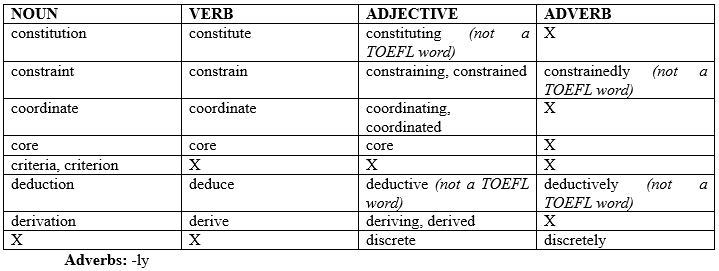In my last two posts on this topic, I looked at the first 6 hard words in the Magoosh TOEFL Vocabulary PDF. (The PDF divides TOEFL words into easy, common, medium, and hard levels.) Today, we’re going to look at hard words 9 through 16.
Like last time, I’ll show you the different forms of these hard words, and how each form is used. Make sure you read this guide along with the basic definitions and example sentences in Magoosh’s Vocab PDF.
Difficult words 9-16: Different suffixes, different word forms
Below is a list of 8 hard words from the Magoosh TOEFL Vocabulary PDF. The different forms of each word are also listed. You’ll see that certain word forms are not actually TOEFL words. Studying these non-TOEFL forms is optional. Learning them is not necessary for TOEFL study, but may help your overall English skills.
Suffixes that change the form of the words:
Nouns: -tion, -aint, -ia, -ion, -ation
Verbs: -ate
Adjectives: -ing, -ed, ive

Explanations of the words in the chart
(Read the definitions from the original PDF first.)
- Constitute
A constitution refers to what something is made of (an army tank has a strong constitution, because it’s made of sturdy materials), or someone’s state of emotion or health (if you get sick easily, you have a weak constitution). The verb constitute describes the act of creating a whole thing from smaller parts. For example, 9 innings constitutes a complete baseball game. The parts that make up a whole thing could be described as constituting Italy, the UK, France, and Greece are some of the constituting nations of the European Union.
- Constrain
A constraint is something that limits or restricts something else. For example, there are time constraints on the TOEFL; because your time on the exam is limited. To constrain is to limit or restrict something. If you have a job, your job may constrain the amount of time you spend studying. If something places limits on something else, that thing can be described as constraining. The thing that is constrained can be described with the adjective To go back to my example of TOEFL time limits, the TOEFL has constraining rules that limit the amount of time that constrained test takers can spend on each section of the exam. You do something constrainedly if you do it in a way that shows you are constrained. You would enter your last few answers in a TOEFL section very constrainedly if you had to hurry because you were almost out of time.
- Coordinate
As a noun, coordinate refers to a specific point in space. If you have a GPS in your car, you can set the GPS to lead you to specific coordinates, such as a certain street corner or building. To coordinate (verb) is to organize two or more things together. To coordinate a party, for instance, means to organize the different parts of the party— the space for the party, the food and drink for the party, the party invitations, and so on. Coordinating and coordinated both describe things that are organized in relation to each other. If someone is wearing coordinating colors, they are wearing colors of clothing that match well. Such a person could also be described as wearing coordinated
(Note: The verb and noun forms of “coordinate” are pronounced differently. Play the sound file below to hear the difference.)
- Core
Core can be a noun, a verb, or an adjective. Each grammatical form of the word has the same pronunciation. A core is the center of something. It can be a physical center, such as the earth’s molten core. It can also be a central concept. The core of an argument would be the most important idea or ideas in the argument. To core means to remove the center of something. The verb form of this word only refers to the physical center of something. A common phrase with this verb is “to core of an apple,” referring to removing the center of the apple that has the seeds in it. As an adjective, core means related to the center of something. To go back to earlier examples, you could talk about a core idea in an argument, or core pieces of an apple.
- Criteria
Criteria is a plural verb that refers to the measurements you use to judge something. Your criteria for whether you should wear a jacket could be the temperature outside, the amount of wind, and whether it’s raining. The singular form of criteria is criterion. Sometimes your TOEFL score is the only criterion a school looks at when you apply to it.
- Deduce
A deduction is an idea or fact that you figure out through logic and observation. If you smell salt in the air, you could make a deduction that you are near the ocean. In finance, a deduction can also mean a calculation where you subtract a number based on the amount of money that was spent or lost. However, you probably won’t see this financial use on the TOEFL. To deduce means to figure something out through logic and observation. Something is deductive if it uses deduction to find facts. This adjective is often used in the phrase “deductive” You can use the adjective form of this word by saying that someone who uses deductive reasoning is thinking deductively.
- Derive
To derive means to take something from an earlier original source. For example, sugar can be derived from sugarcane, beets, corn, and other sweet plants. A derivation is a thing that is derived from something else. Refined cane sugar is a derivation of the sugarcane plant. Something is described as deriving if it takes something from an original source. For example process of refining sugar from sugarcane could be called a deriving A thing that comes from a deriving process can be described as derived, such as “the derived sugar that comes from sugarcane, beets, and corn.”
- Discrete
Discrete describes things that are separate and different from each other. America and Canada do not have discrete cultures, but they are discrete nations with clear borders and separate governments. To use the adverb form, you could say the two countries do not have discretely different cultures, because there is a lot of similarity between American and Canadian culture.






Leave a Reply